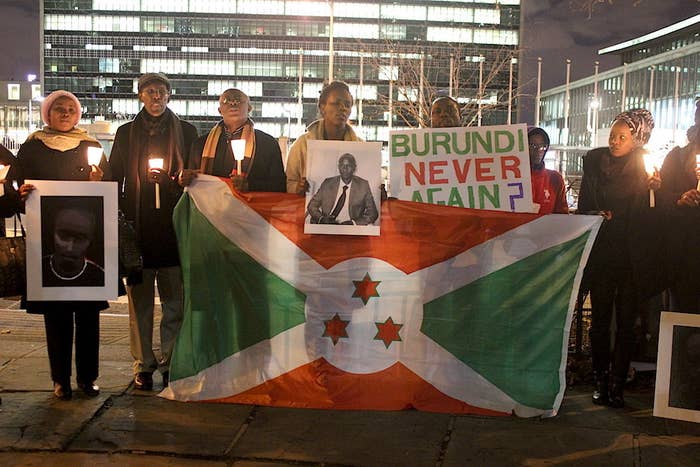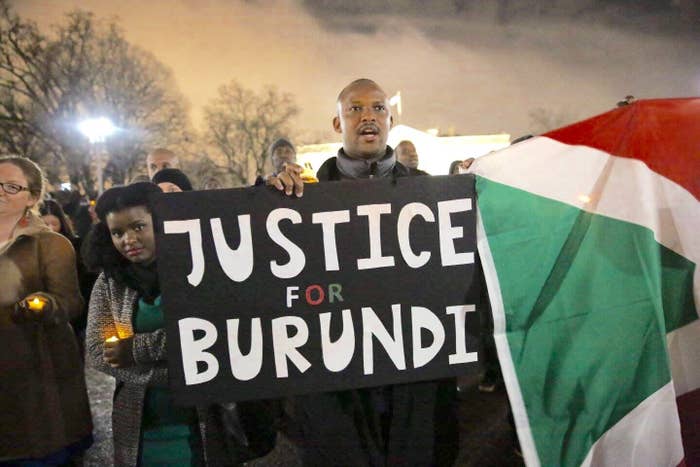
NEW YORK — While the United Nations Security Council on Friday night voted to begin planning peace talks to end the civil war in Syria, a group of about 30 Burundians struggled to light candles outside.
They were gathered at a small park across the street from the U.N. to draw attention to the increasingly fraught conflict in their home country. The wind chill made it difficult for them to grip the lighters.
Burundi has been restive since April, when citizens protested President Pierre Nkurunziza's bid for a third term, arguing that it violated a 2005 peace deal that ended the country's 12-year civil war.
An attempted coup followed in May, and more than 400 people, including leading military figures, have been killed in the last eight months. Troubling hate speech has been denounced by members of the U.N. Security Council, and questions have been raised by the political opposition in exile about the possibility of genocide.
As the conflict escalates, Burundians in the diaspora grapple with the second-hand trauma experienced by their loved ones back home while trying to raise awareness and push for action in the U.S.
In the past week, members of Burundian communities throughout the U.S. organized vigils in Washington, D.C.; New York City; Boston; and Portland, Maine. They made posters with the faces of some of the victims of the violence back home, lit candles, and sang the Burundian national anthem and “Amazing Grace.”
The D.C. gathering took place on Thursday night in Lafayette Square near the White House. Tom Perriello, state department special envoy for the Great Lakes region of Africa, spoke briefly. John Manirakiza, who helped organize the event, told BuzzFeed News that Perriello tried to assure the crowd that the U.S. was “very engaged in making sure the crisis would end.”

Manirakiza, who is in his mid-40s, was born and raised in Burundi, but fled the country in 1995 as a refugee. After short stays in Swaziland and South Africa, he entered the U.S. in 1998, and has been a D.C. resident ever since.
He told BuzzFeed News that hearing news from his family back home about the arbitrary arrests and mysterious killings of civilians brought back memories of the violence he escaped 20 years ago, when the assassination of the country's first democratically elected president led to ethnic killings, a series of power grabs, and a 12-year civil war.
In 1994, Burundi and neighboring Rwanda were embroiled in interethnic conflict between the majority Hutus and minority Tutsis that led to a genocide in which 800,000 people were killed in 100 days. The mass killings stemmed from mounting tensions between political parties led by the opposing groups, which carried out massacres against each other in the 1970s and 80s.
"I have come to terms with what happened to me in the past, but this crisis brings them back, those memories, and it’s very horrible to relive,” he said.
The difficulty of processing news from overseas was echoed by those at the vigil in New York City on Friday night.

Lauretta Kaneza, who also came to the U.S. from Burundi in 1995, said that being so far from home during a crisis was a double-edged sword.
“I’m happy because I feel safe here, but at the same time, I don’t have peace,” she told BuzzFeed News. “My family’s there, and every single day I have to find out how they are doing.”
Because of the seven-hour time difference, Kaneza calls them when she goes to bed at midnight — and again as soon as she wakes up in the morning — to check in. It's hard for her to concentrate at work knowing that on any given day a loved one might not make it home.
“We’ve begged the Security Council, the European Union, the African Union, and they say, ‘We are condemning,’ yet people are still dying,” she said. “What kind of action is that?”
She cited the immediate response to the recent massacre in Paris, calling it “curious” how quickly the world responded to the killings there.
“We don’t have oil, or gold, or diamonds,” she said. “We have people. That’s it.”
Africans from neighboring countries have also offered their support in solidarity with the unfolding crisis in Burundi. Similar vigils have taken place in the capitals of Kenya and Mali.
But while 33-year-old Hervé Fumberi, an organizer for the New York vigil, acknowledged the importance of support from fellow Africans, he maintained that lasting change will require global action.
“I don't think we can point to one region, like the East African community, and say, ‘This is your own responsibility,’ and the rest of the world is absolved of it,” he said.
